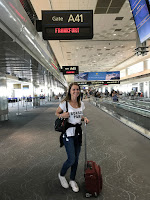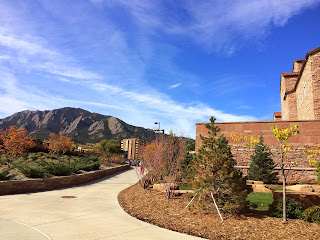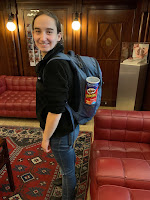Sevilla: Una Ciudad Histórica
As Sevilla’s both our “rest stop”
and second city to explore, we slept in and started our day late (as the
Sevillans do). We started our day with a quick coffee stop and ate some
breakfast before our sightseeing activities. Before all of that, my mom got some pretty cool pictures of Sevilla from our balcony.
Mom got us tickets for the Palacio Real Alcazar (Royal Palace) so
we could bypass the lines and visit. One small problem – we accidentally bought
them for Monday (not realizing that their calendars here start on Monday, not
Sunday…) but there were no problems – thankfully. The ticket attendant scanned
them and let us pass as usual into the Palace’s grounds. We walked through a
variety of courtyards, rooms, tapestries, ceramics, fountains, and koi ponds
while learning some of the history behind the Palace. Construction began in the
10th century by the Moors, who ruled Sevilla for 4 centuries before
the Spanish Reconquista. (Sevilla
fell to the Christians in 1248.) It was partially redone in the 14th
century by King Pedro I. The Palace has a unique Moorish flair to it – it
doesn’t look quite as “Spanish” as other architecture we’ve seen on this trip.
Fun fact - it used to be home to Ferdinand and Isabel, the monarchs that
commissioned Columbus’ voyages.
I call this series of pictures "no paparazzi, please." Goofy, I know... but my brother got some of the pictures that might appear on a People magazine :)
Next, we went to the Torre de Oro (Golden Tower) to get some
nice views of Sevilla and explore a few rooms with exhibits about the history
of Sevilla. This former military watchtower was constructed in the early 13th
century by the Moors to control access to Sevilla via the Guadalquivir River,
but now serves as a cultural monument. On our way back down the tower, we saw
paintings and maps from Columbus, Magellan, and Vespucci who started their
voyages on the river this tower watches over.
We then took our daily gelato stop
at Amorino before taking a lengthy siesta
to rest up for the night.
We ate dinner at La Bodeguita Antonio Romero around 6:30
so we could eat before heading out on our final night adventure in Sevilla. It
was delicious but adventurous! Our waiter mostly spoke Spanish (a good chance
to use what I’m learning in school) and many of the menu items looked more
traditionally Spanish compared to other places we’d eaten. We tried their
gazpacho (served cold, with ice, in a glass), chorizo ibérico (sausage – yum!),
manchego cheese, montaditos (small sandwiches) with ham, chicken, and bread.
After dinner, we crossed the
bridge to the Triana neighborhood in
Sevilla al otro lado del rio (on the
other side of the river). It’s colorful and cute, and features the Church of Santa Ana. We strolled
through the streets, catching views of the Torre del Oro, Cathedral, and
bullring. (Other sites that weren’t open include the Castillo de San Jorge, market, and the Calle San Jacinto (which we walked by).
We watched the sunset (at
like 9:00) from our roof back at the apartment.
QOTD: “Thank God for places that are open from noon to midnight, so
we don’t have to wait until 8:30 to eat!” -Mom, being grateful for our dinner
place so we could eat!
Sevilla Favorites:
·
Restaurant - La Bodeguita Antonio Romero (traditional
Spanish cuisine) or Maccherone (Italian)
·
Gelato – Amorino
·
Site – Plaza de los Toros
·
Cultural Experience – Flamenco
Hasta luego Sevilla!
Amy


































Comments
Post a Comment